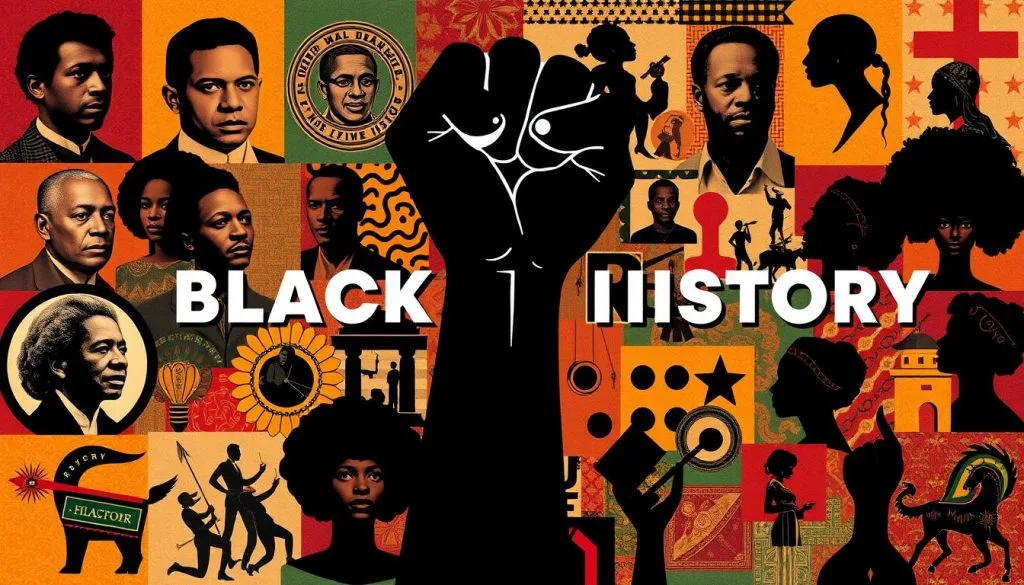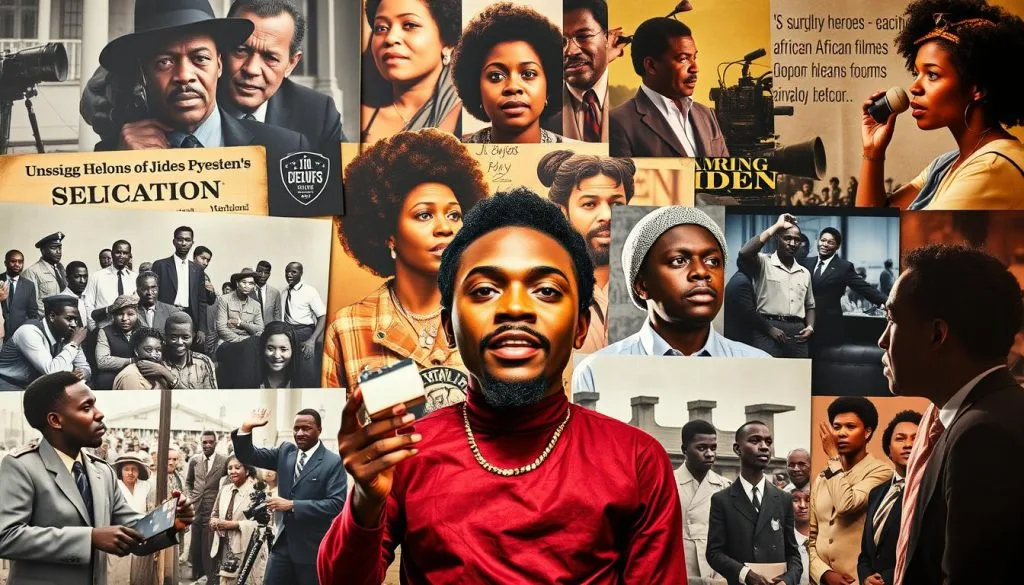Many Americans, 73%, think Black History Month is key to understanding America’s past. Yet, few know about the big roles Black people have played in our country’s growth. Black History Documentaries and African American Films have helped reveal these important stories, giving a voice to those who were once ignored.
Learning about Black History Month helps us see the lasting effects of Black culture. From the start of African American Films to today’s Black History Documentaries, these mediums have been vital. They keep alive the history and experiences of Black Americans.
Key Takeaways
- Black History Month is a celebration of the rich and diverse history of Black people in America
- African American Films have played a significant role in preserving Black history and culture
- Black History Documentaries provide a platform for untold stories and silenced voices
- Continued celebration and recognition of Black History Month are essential for understanding American history
- Exploring Black History Month can help promote diversity, equity, and inclusion
- Black culture has had a profound impact on American society, from arts to politics
The Origins of Black History Month
Black History Month started in the early 1900s. Historian Carter G. Woodson wanted to celebrate African American culture and achievements. He thought educational videos could help people learn about Black history.
In 1926, the first Black History Week was celebrated. This event was a big step towards today’s Black History Month. It helped spread awareness through Civil Rights Documentaries and other educational materials.
Carter G. Woodson’s Vision
Woodson’s dream for Black History Month was to celebrate African American culture. He also wanted to promote diversity, equity, and inclusion (DEI) in society. He believed educational videos were key in teaching people about Black history.
The First Celebration in 1926
The first Black History Week in 1926 was a major event. It started a journey to promote Civil Rights Documentaries and other educational materials. These materials showed the struggles and successes of African Americans.
Now, Black History Month is celebrated in the U.S. and other countries. It focuses on promoting diversity, equity, and inclusion (DEI). Educational videos and Civil Rights Documentaries still play a big role in teaching people about Black history.
Why February Was Chosen
February was picked for Black History Month because of two important birthdays. Abraham Lincoln and Frederick Douglass were born in this month. It’s a time to think about the big role Black people have played in American history and culture. This is often shown in Black Culture Films and Historical Documentaries.
To celebrate Black excellence, consider the following actions:
- Watch Black Culture Films that highlight the experiences and achievements of Black individuals.
- Explore Historical Documentaries that provide insight into the history and struggles of Black people in America.
- Support Black-owned businesses and organizations that promote Black culture and education.
By doing these things, we can help make society more inclusive and fair. As we celebrate Black History Month, let’s also remember the need for ongoing learning. We can use Historical Documentaries and Black Culture Films to learn more about Black American history and culture.

Through these efforts, we can deepen our understanding and appreciation of Black history and culture. This will help us build a brighter future for everyone.
| Month | Significance |
|---|---|
| February | Black History Month, coinciding with the birthdays of Abraham Lincoln and Frederick Douglass |
Key Figures in Black History
Black history is filled with remarkable individuals who have made significant contributions to the fight for equality and justice. Their stories have been featured in various Social Justice Films and Black History Documentaries. These films educate audiences about the importance of their work.
Some key figures in Black history include:
- Harriet Tubman, a former slave who became the conductor of the Underground Railroad
- Martin Luther King Jr., a prominent civil rights leader who advocated for nonviolent resistance
Harriet Tubman: The Conductor of the Underground Railroad
Harriet Tubman’s bravery and selflessness have inspired countless people. Her story has been told through various Black History Documentaries. She helped hundreds of enslaved individuals escape to freedom.
Martin Luther King Jr.: Champion of Civil Rights
Martin Luther King Jr.’s message of love and equality continues to resonate with people today. His legacy has been featured in numerous Social Justice Films. His leadership in the civil rights movement played a crucial role in shaping American history.
Unsung Heroes of Black History
Black history is full of amazing people who have changed the world. Some are well-known, but many are not. Their stories are key to understanding Black history’s impact today. African American Films and Educational Videos help share these important stories.
Bessie Coleman was the first Black female pilot. She opened doors for Black pilots. George Washington Carver was a genius in agriculture, finding new uses for peanuts and sweet potatoes.
Bessie Coleman: The First Black Female Pilot
Coleman’s courage and hard work inspire many. Her story shows the power of education. It also highlights the role of Educational Videos in sharing these stories.
George Washington Carver: Agricultural Innovator
Carver’s work changed farming forever. His legacy inspires today’s innovators. African American Films can make his story come alive, showing the value of diversity.

By honoring these unsung heroes, we learn more about Black history. Their stories remind us of the need for diversity and inclusion. Educational Videos and African American Films are key in teaching these values.
| Unsung Hero | Contribution |
|---|---|
| Bessie Coleman | First Black female pilot |
| George Washington Carver | Agricultural innovator |
Black History Month and Education
Education is key to promoting diversity and inclusivity. It’s important to include Black history in school curricula. This helps students understand American history and culture better. Resources like Civil Rights Documentaries and Black Culture Films are great for this.
Schools can celebrate diversity by hosting events and activities. For instance, they can show Black Culture Films and invite guest speakers. Teachers can also use Civil Rights Documentaries to teach about Black Americans’ struggles and achievements.
- Creating a Black history month club or organization
- Inviting Black authors, artists, and musicians to speak to students
- Developing curricula that include Black history and culture
- Providing resources and support for Black students and educators
By adding Black history to curricula and celebrating diversity, schools can foster inclusivity. This approach provides students with a well-rounded education. It uses a mix of Civil Rights Documentaries, Black Culture Films, and other resources to highlight Black excellence.
| Resource | Description |
|---|---|
| Civil Rights Documentaries | Documentaries that showcase the struggles and achievements of Black Americans |
| Black Culture Films | Films that celebrate Black culture and excellence |
| Black History Month Clubs | Clubs or organizations that promote Black history and culture |
Celebrating Through the Arts
Black culture has greatly influenced American arts. Many Black artists and musicians have left a lasting mark. From blues and jazz to hip-hop and R&B, Black music has shaped America’s sound. Historical Documentaries help keep Black music’s history alive and its impact on society.
Events and festivals celebrating Black culture bring people together. They feature music festivals and art exhibitions. These events also show Social Justice Films and documentaries about the Black community’s struggles and victories.
Influence of Black Artists and Musicians
Black artists and musicians have shaped American culture. They use their platforms to talk about social justice and equality. Their work can be seen in music, film, literature, and visual arts.
Events and Festivals Celebrating Black Culture
Events and festivals celebrating Black culture are key to preserving heritage. They give Black artists and musicians a chance to showcase their talents. People come together to celebrate Black excellence at these events.
Some notable events include the African American Festival and the Black Arts Festival. They feature music, art, and Historical Documentaries. These highlight the rich history and culture of the Black community.
Impact of Black History Month on Society
Black History Month has a big impact on society. It raises awareness about Black history and culture. It also promotes equality and inclusivity.
Through African American Films and Black History Documentaries, we learn about African Americans’ experiences and contributions. This helps us understand and appreciate their role in shaping the nation.
The month-long celebration lets people engage with Black culture. They can attend events, festivals, and exhibitions that showcase African American heritage. This promotes cross-cultural understanding and exchange, helping to break down barriers and challenge stereotypes.
Raising Awareness and Promoting Equality
Black History Month promotes equality by highlighting African Americans’ achievements and contributions. Black History Documentaries and African American Films share their stories and experiences. This challenges dominant narratives and promotes a more nuanced understanding of American history and culture.
The Ongoing Fight Against Racism
Racism and inequality still exist, and we must continue fighting for justice and equality. Black History Month reminds us of the ongoing struggle for civil rights and social justice. It shows the importance of continued activism and advocacy in promoting a more equitable and just society.
Global Perspectives on Black History Month
Black History Month is celebrated not just in America. It’s also marked in Canada, the UK, and the Caribbean. Through Educational Videos and Civil Rights Documentaries, we learn about Black people’s struggles and triumphs globally.
Celebrations Around the World
In Canada and the UK, Black History Month is celebrated in special ways. Canada holds events and exhibitions to boost diversity and inclusion. The UK hosts lectures, workshops, and cultural events to honor Black contributions to British society.
The Importance of International Awareness
It’s key to spread awareness and work together globally for diversity and fairness. By sharing Educational Videos and Civil Rights Documentaries, we can highlight Black people’s achievements worldwide. This helps build a more inclusive and fair society through global efforts and cultural exchange.
How to Celebrate Black History Month
Celebrating Black History Month is a great way to show respect and understanding of Black culture. You can do this by watching Black Culture Films and Historical Documentaries. These films and documentaries share the stories and achievements of Black people.
Getting involved in your community is also key. Here are some ideas:
- Attend Black History Month events and festivals
- Join in cultural activities like music and dance
- Help out at organizations that support Black communities
Supporting Black-Owned Businesses
Backing Black-owned businesses is vital for their growth and success. Here are ways to help:
| Business Type | Importance |
|---|---|
| Food and Beverage | Helps the local economy and brings cultures together |
| Arts and Entertainment | Highlights Black talent and creativity |
| Education and Training | Offers chances for learning and personal growth |
The Evolution of Black History Month
Black History Month has grown a lot since it started. It has changed from a week to a whole month. This change helps us understand the value of Social Justice Films and Black History Documentaries in fighting for equality.
This shift has made Black culture and history more known. As the world gets closer, Black History Month’s importance spreads worldwide. It shows the need for everyone to know and value Black heritage.
Changes Over the Decades
One big change is adding Black history to school lessons. Also, Black History Documentaries have come out, sharing Black people’s stories. These steps help us see and respect Black culture more, leading to a fairer world.
The Future of Commemoration
Looking ahead, we must keep celebrating Black history and culture. We can do this by making and sharing Social Justice Films and Black History Documentaries. These stories can teach and motivate people to fight for equality and justice.
Resources for Continued Learning
Black History Month is a time to look back, celebrate today, and work towards a fairer tomorrow. But learning and growing doesn’t stop after the month is over. There are many resources to help you keep learning about African American history and culture.
Books and Documentaries to Explore
Start with books that give you a deeper look into the Black experience. “The Souls of Black Folk” by W.E.B. Du Bois and “The New Jim Crow” by Michelle Alexander are must-reads. They offer historical insights and critical views.
Watch impactful African American films and documentaries too. “The African Americans: Many Rivers to Cross” and “I Am Not Your Negro” are great examples. They tell stories through powerful visuals.
Online Platforms with Valuable Content
Many online platforms have educational videos and resources on Black history and culture. The National Museum of African American History and Culture and the official Black History Month website are great places to start. They offer curated content, virtual exhibits, and ways to keep learning.
